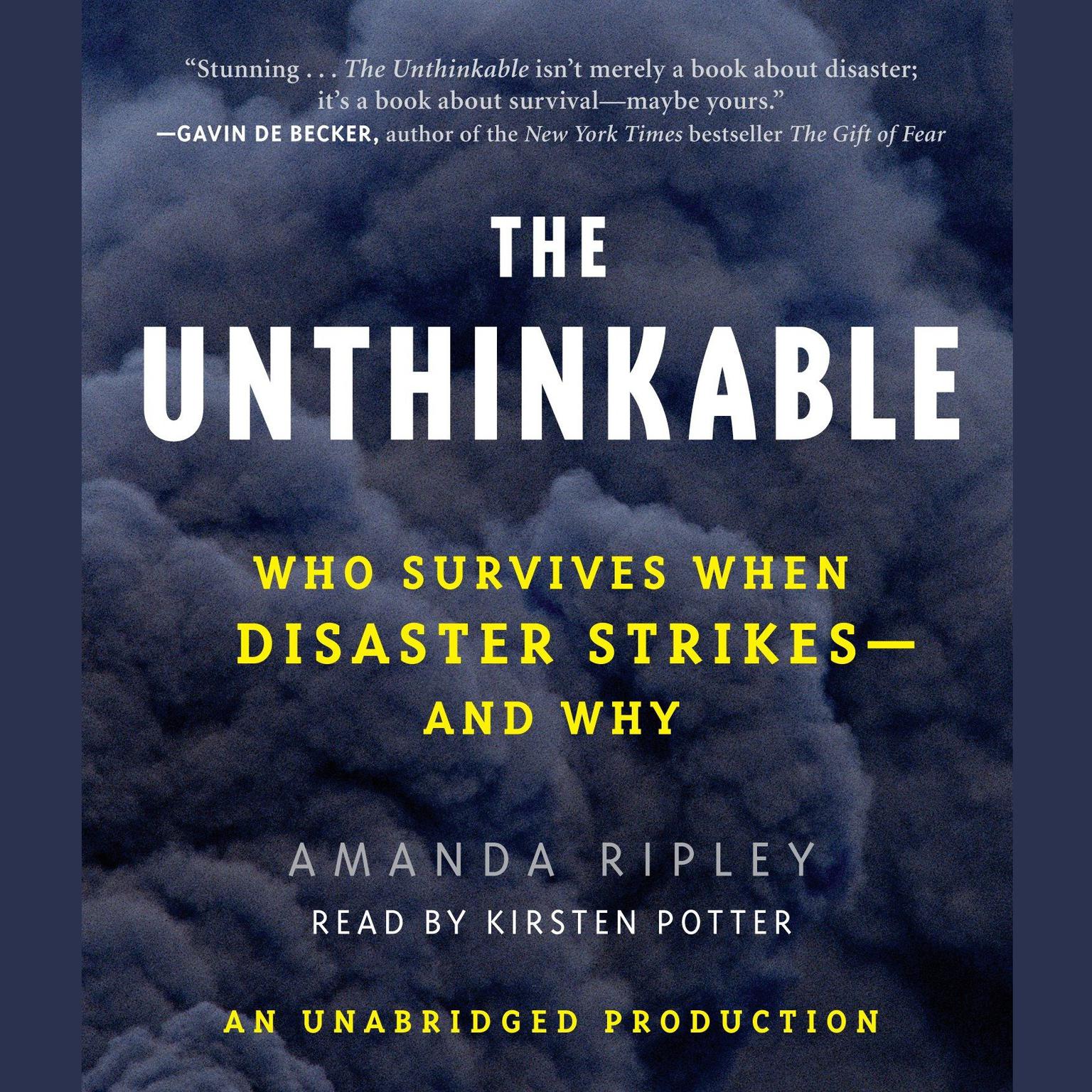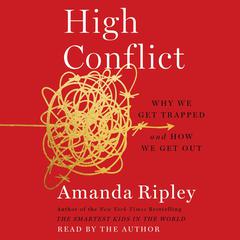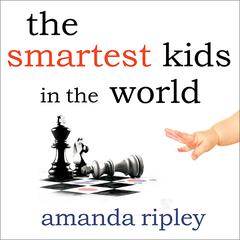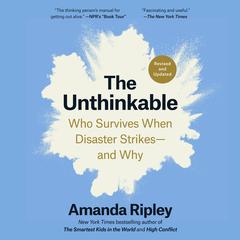 Play Audiobook Sample
Play Audiobook Sample
The Unthinkable: Who Survives When Disaster Strikes - and Why Audiobook
 Play Audiobook Sample
Play Audiobook Sample
This audiobook is no longer available through the publisher and we don't know if or when it will become available again. Please check out similar audiobooks below, and click the "Vote this up!" button to let us know you're interested in this title. This audiobook has 3 votes
Quick Stats About this Audiobook
Total Audiobook Chapters:
Longest Chapter Length:
Shortest Chapter Length:
Average Chapter Length:
Audiobooks by this Author:
Publisher Description
Discover how human beings react to danger—and what makes the difference between life and death
“Fascinating and useful . . . [shows that] the most important variable in an emergency is your own behavior.”—The New York Times
Today, nine out of ten Americans live in places at significant risk of earthquakes, hurricanes, tornadoes, terrorism, or other disasters. Tomorrow, some of us will have to make split-second choices to save ourselves and our families. How will we react? What will it feel like? Will we be heroes or victims?
In her quest to answer these questions, award-winning journalist Amanda Ripley traces human responses to some of recent history’s epic disasters, from the explosion of the Mont Blanc munitions ship in 1917–one of the biggest explosions before the invention of the atomic bomb–to the journeys of the 15,000 people who found their way out of the World Trade Center on September 11, 2001. To understand the science behind the stories, Ripley turns to leading brain scientists, trauma psychologists, and other disaster experts. She even has her own brain examined by military researchers and experiences, through realistic simulations, what it might be like to survive a plane crash into the ocean or to escape a raging fire.
Ripley comes back with precious wisdom about the surprising humanity of crowds, the elegance of the brain’s fear circuits, and the stunning inadequacy of many of our evolutionary responses. Most unexpectedly, she discovers the brain’s ability to do much, much better–with just a little help.
Download and start listening now!
"Probably one of the most fascinating books I have read in 2012. Couldn't put it down. Amanda Ripley covers tsunamis, fires, plane crashes, the Katrina flood, the 1993 incident at the Twin Towers, and 9/11. She delves deeply into how people think and behave during disasters. I've learned interesting things like how some people are better suited to survive disasters and even have different blood chemistry than the rest of the population. A great read for those who want to be better prepared to survive an emergency or catastrophe."
— Angel (5 out of 5 stars)
Quotes
-
Engrossing and lucid . . . facing the truth about the human capacity for risk and disaster turns out to be a lot less scary than staying in the dark.
— O: The Oprah Magazine -
The Unthinkable isn’t merely a book about disaster; it’s a book about survival—maybe yours.
— Gavin de Becker, author of The Gift of Fear -
Ripley is a voyeur on a mission. . . . Her conviction: We’d all stand a better chance of surviving a disaster if we understood what happens to our little gray cells when things get ugly. . . . Spiced with surprising factoids, this book might save your life one day.
— Bloomberg News -
This is a book with a purpose, meant to change things.
— Rob Hardy, The Commercial Dispatch -
These tales leave your viscera enflamed because they compel two questions: ‘What would it feel like to go through that?’ and ‘Would I do the right thing and survive?’ This is an irresistible book.
— Robert M. Sapolsky, author of Determined -
The Unthinkable is the most magnificent account of a survivor’s mind that I have ever read. It has helped me know and accept some of my reactions during my seventy-two-day ordeal in the Andes. I can now understand how fear motivated me, and how denial also played a part. This book will help those who’ve never faced disaster to understand their own behavior and be prepared should their luck run out one day.
— Nando Parrado, author of Miracle in the Andes -
The Unthinkable reveals why, under the same circumstances, some people caught up in a disaster survive and others do not. In her well-crafted prose, Amanda Ripley shows us all how to prepare to meet danger and increase our chances of surviving the unthinkable.
— Bruce Henderson, author of Down to the Sea and True North -
When a disaster occurs we invariably learn the ‘what’ of the event—how many died, how many survived. Amanda Ripley’s riveting The Unthinkable provides genuine insight into the ‘why’ behind the numbers. This remarkable book will not only change your life, it could very well save it.
— Gregg Olsen, author of The Deep Dark: Disaster and Redemption in America’s Richest Silver Mine -
Ever fantasize about what you would do in a disaster? How would you survive? How would you behave? After interviewing survivors of the World Trade Center attack, Amanda Ripley sifted through amazing tales of survivors from other disasters and mined various sociological, psychological, and neurological studies. Her insights are absolutely fascinating, and they could come in handy one day.
— Walter Isaacson, author of Elon Musk “A must read. We need books like this to help us understand the world in which we live. -
Fascinating and useful.
— The New York Times -
“A must read. We need books like this to help us understand the world in which we live.
— Nassim Nicholas Taleb, author The Black Swan and Fooled by Randomness -
“Engrossing and lucid . . . facing the truth about the human capacity for risk and disaster turns out to be a lot less scary than staying in the dark.
— O: The Oprah Magazine -
Ever fantasize about what you would do in a disaster? How would you survive? How would you behave? After interviewing survivors of the World Trade Center attack, Amanda Ripley sifted through amazing tales of survivors from other disasters and mined various sociological, psychological, and neurological studies. Her insights are absolutely fascinating, and they could come in handy one day.
— Walter Isaacson, author of Elon Musk
The Unthinkable Listener Reviews
-
" Being a Disaster-Scenario Queen, this book was the most useful thing I have read in years. "
— Idiosyncratic, 2/20/2014 -
" This is a handbook that everyone should read. You will never stay in a hotel or board an airplane again without taking more notice of your surroundings - and it may save your life. Amanda explains why humans often do - or don't do - the things we do, and gives her readers a checklist to break the cycle. Read this book and complete your own critical self-analysis. "
— Rick, 2/20/2014 -
" Should be mandatory reading for everybody. "
— Alida, 2/9/2014 -
" A successful journalist, Ripley can really smith words.This piece reads fast and easily. Also, without a doubt she introduces some interesting concepts about behavior of human beings in seriously threatening situations. I just wish that her conclusions were drawn more from scientific data and less from anecdotes and memories of victims. "
— Linda, 2/8/2014 -
" I really struggled to get into this book and ended up not being able to finish it. I read the first 100 pages and then half-skimmed the rest. It struck me as just a compilation of somewhat interesting stories about tragedies and psychological and sociological studies about our reactions to "disasters". I didn't "get" her theory or really care. "
— Josh, 2/2/2014 -
" This should be a must read for everyone as we are all potential victims of disasters both natural and man-made. It also will make me laugh less and pay attention more at the next fire drill. "
— Linda, 1/15/2014 -
" I found this book fascinating, well-written, and useful. To the point that I'd find myself reading it in the bathtub for an hour at a time. I checked it out from the library and renewed it just because I wasn't ready to part with it, even though I'd already finished it. "
— Shokufeh, 1/11/2014 -
" A SERIES OF STORIES EMPHASIZING THE PSYCHOLOGICAL STAGES A HUMAN GOES THROUGH DURING CRISIS. "
— BLACK, 10/14/2013 -
" Highly recommended - not only was it interesting, but I felt like I learned something about disaster preparedness, when I hadn't initially expected to learn this. "
— Kelly, 9/10/2013 -
" This is an absolutely fascinating study of those cases in disaster where some people survive and others don't ... and what differentiates them. Hint - its almost always not physical. "
— Chris, 9/6/2013 -
" Wow, this book was intense. I couldn't put it down. It could've even been longer as she could've gone even way more into the psychology of disaster response and trauma response. Incredible bibliography, too! "
— Bella, 9/2/2013 -
" This book was a great start into the psych of Fear, Heroes, & Survival. "
— Jason, 6/8/2013 -
" This should be required reading everywhere! How would you react if caught in a disaster? So much better to plan ahead, than to found out the hard way. Fascinating read. "
— Cynthia, 2/23/2013 -
" Very interesting book looking at who survives disasters/extreme situations and why they survive. Not a dry read at all, bits of humour and a very human viewpoint. Oh, and I really hope I have a decent sized hippocampus. It seems like it might be important. "
— beentsy, 1/15/2013 -
" Listened to this on tape & found it fascinating. Highly recommend it. "
— Barbara, 10/16/2012 -
" This woman has been in my brain. I've always though, as she does, that the "first responders" at a crisis not police or firefighters, but the people that are there. "
— Sandra, 10/15/2012 -
" A very interesting introspection into what makes the brain tick during a disaster/emergency. Why do some people freeze and become numb while others begin to give orders which anyone listening follows? Lots of research by the author with recent accounts including 9/11 and Katrina. "
— Kari, 5/30/2012 -
" Worth your time if you have any interest in these types of things. Results of a lot of research on who survives disasters and why. "
— Michael, 5/27/2012 -
" I wish I could give this book six stars. It is fascinating, absolutely fascinating and could very well save you life. This is a MUST-READ! "
— Caroline, 4/2/2012 -
" Concise accounts of regular people involved in all kinds of extreme situations; hurricanes, fires, terrorist attacks, etc. Gripping stuff. "
— Craig, 8/31/2011 -
" Great understanding of risk managment as well as emergency prepairedness. Many stories about disasters and police/military events. Definate re-read. "
— Lance, 5/13/2011 -
" The site says that there are 304 pages, but my copy has 227... "
— Trish, 5/4/2011 -
" Ripley links the effect of catastrophe with the science of human reaction. Compelling, but also compassionate. This book is worth reading, if only so you'll know the story of people like Walter Bailey and Rick Rescoria. "
— Jeff, 4/5/2011 -
" From now on I will always locate the exits in buildings and listen to on the on flight safety instructions. "
— Julie, 3/17/2011 -
" 4.5 stars. I really liked this book, it was fascinating. I talks about several different disasters and many different reactions to disaster that our bodies and minds have. It is easy to read and really intriguing. "
— Christin, 3/11/2011 -
" This book really changed the way I think about things now, especially when I'm traveling. I'd recommend it to anyone! "
— Teresa, 3/7/2011 -
" This book was a great start into the psych of Fear, Heroes, & Survival. "
— Jason, 3/6/2011 -
" Interesting reading and worthwhile to know how to forecast how you would likely respond in an emergency. "
— Paul, 2/1/2011
About Amanda Ripley
Amanda Ripley is the New York Times bestselling author of The Smartest Kids in the World and The Unthinkable. She writes for The Atlantic, Politico, the Washington Post, New York Times, and ?Wall Street Journal, among other publications.
About Kirsten Potter
Kirsten Potter has won several awards, including more than a dozen AudioFile Earphones Awards and been a three-time finalist for the prestigious Audie Award for best narration. Her work has been recognized by the National Foundation for Advancement in the Arts and by AudioFile magazine, among many others. She graduated with highest honors from Boston University and has performed on stage and in film and television, including roles on Medium, Bones, and Judging Amy.






